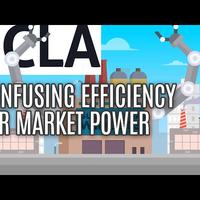Essential UCLA School of Economics: Confusing Efficiency for Market Power
Lo esencial de la Escuela de Economía de la UCLA: Confundir eficiencia con poder de mercado
UCLA経済学部の本質:効率性と市場支配力の混同
Essential UCLA School of Economics: Confundir eficiência com poder de mercado
Основная школа экономики Калифорнийского университета в Лос-Анджелесе: путаница эффективности с рыночной властью
Temel UCLA Ekonomi Okulu: Verimlilik ile Piyasa Gücünü Karıştırmak
Essential UCLA School of Economics: Плутанина між ефективністю та ринковою владою
加州大学洛杉矶分校经济学院的精髓:混淆效率与市场力量
Welcome to the essential ideas of the UCLA School of Economics.
It's common to think the reason firms in industries with just a few companies have
Häufig wird angenommen, dass Firmen in Branchen mit nur wenigen Unternehmen den Grund für
É comum pensar-se que a razão pela qual as empresas de sectores com poucas empresas têm
Поширеною є думка, що причиною того, що фірми в галузях, де працює лише кілька компаній, мають
high profits, is because their size gives them power. Power to charge higher prices, force
lucros elevados, é porque a sua dimensão lhes dá poder. Poder para cobrar preços mais altos, forçar
competitors out of business, and prevent new companies from entering the market.
os concorrentes não podem exercer a sua actividade e impedem a entrada de novas empresas no mercado.
This view led governments to be suspicious of large firms, often resulting in heavy
Este ponto de vista levou os governos a desconfiarem das grandes empresas, o que muitas vezes resultou em pesadas
government regulation including preventing large firms from buying competitors.
regulamentação governamental, incluindo o impedimento de grandes empresas comprarem concorrentes.
Harold Demsetz, a key member of the UCLA School of Economics had a different
explanation for why some large firms were successful. He explained that some large
firms were more profitable because they were more efficient.
Let's explore this idea with an example. Ivan's car company is small, and produces
100,000 cars a year. Henry's car company is much larger and produces 1,000,000 cars
a year. Because of its size, Henry's company
achieves what's known as economies of scale. Henry's company builds an assembly line and,
consegue aquilo a que se chama economias de escala. A empresa de Henry constrói uma linha de montagem e..,
досягає так званого ефекту масштабу. Компанія Генрі будує складальну лінію і..,
because of the volume of cars produced, it operates three shifts, running
devido ao volume de automóveis produzidos, funciona em três turnos, com
24 hours a day. Ivan's factory can run only one shift because of its lower volume.
24 horas por dia. A fábrica de Ivan só pode funcionar num turno devido ao seu menor volume.
This means the costs of building and maintaining the factory are spread over more cars
Isto significa que os custos de construção e manutenção da fábrica são distribuídos por mais automóveis
in Henry's factory, and so his cost per car is less, which leads to higher profits for his
na fábrica do Henry, pelo que o seu custo por carro é menor, o que conduz a lucros mais elevados para a sua
company. With these higher profits Henry can offer higher salaries to attract better
empresa. Com estes lucros mais elevados, a Henry pode oferecer salários mais elevados para atrair melhores
management, and invest more in research and development – both of which can make
gestão e investir mais em investigação e desenvolvimento - o que pode contribuir para
his company even more efficient and profitable. And so, Henry's car company is more profitable
a sua empresa ainda mais eficiente e rentável. E assim, a empresa automóvel de Henry é mais rentável
because it has economies of scale - not because it has an unfair advantage as a
porque tem economias de escala - e não porque tem uma vantagem injusta como
large firm in an industry with only a few competitors.
This insight from Demsetz led to a substantial
rethinking of government regulations in the United States and around the world.
For more information on the UCLA economics visit EssentialUCLAeconomics.org, and to learn about
more essential scholars, visit EssentialScholars.org

